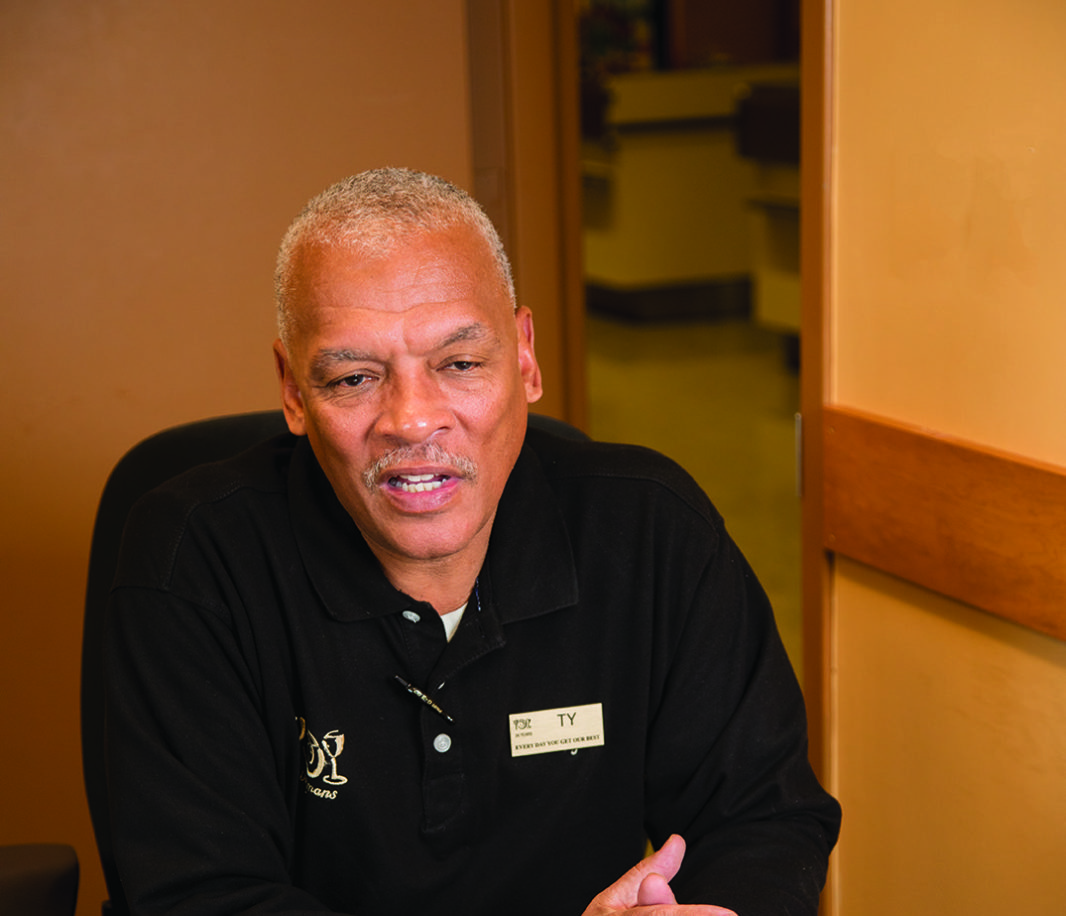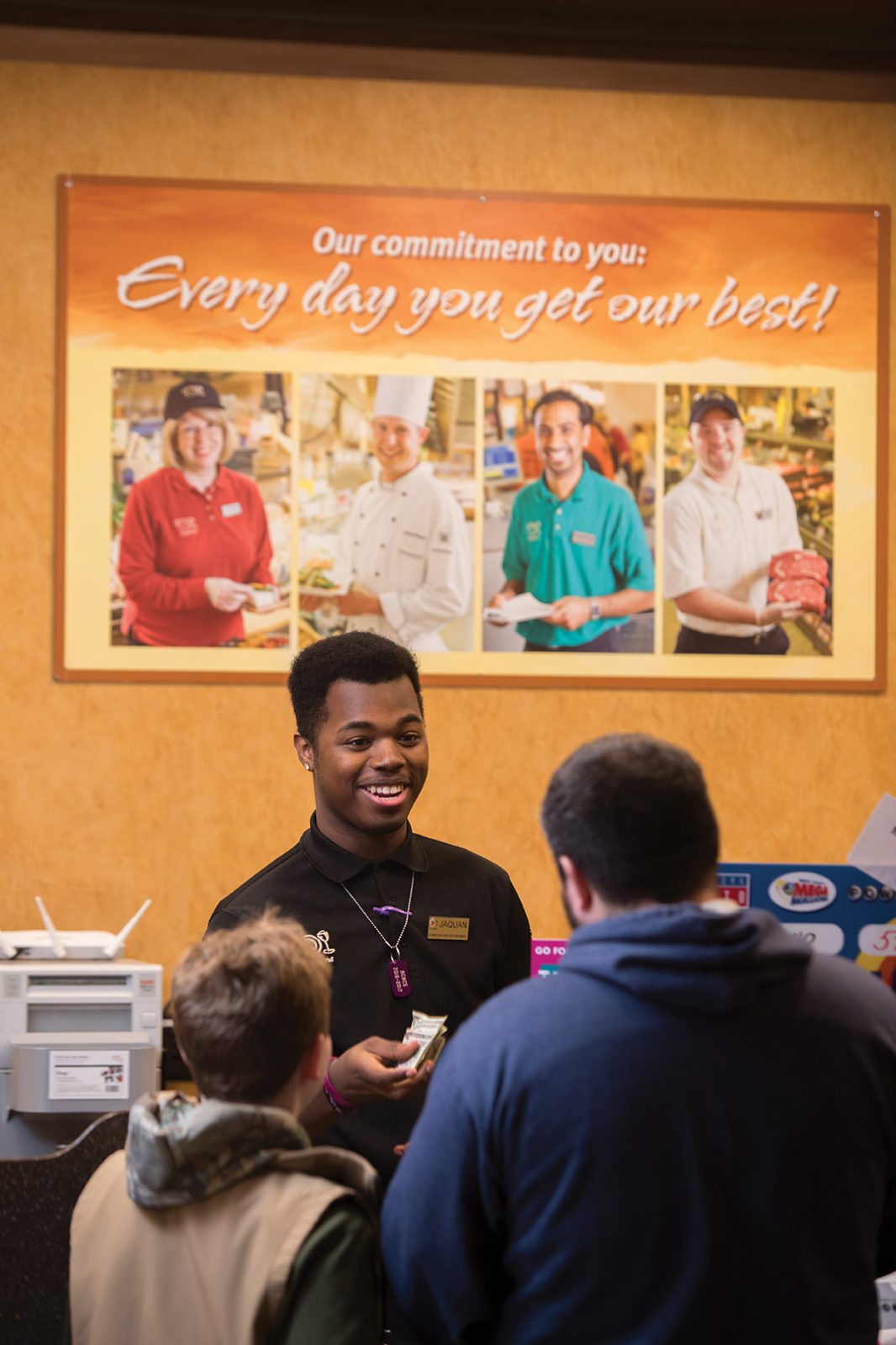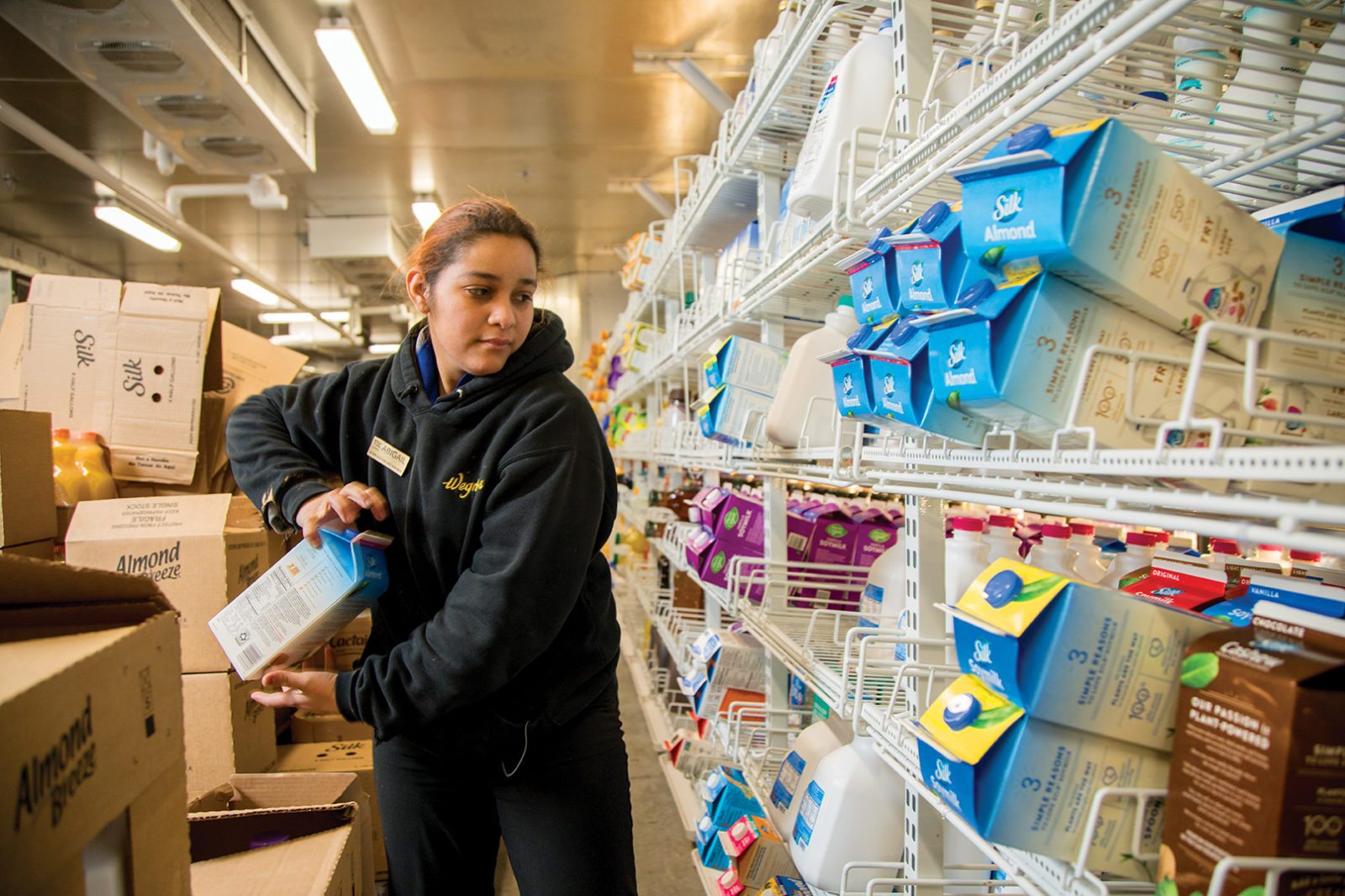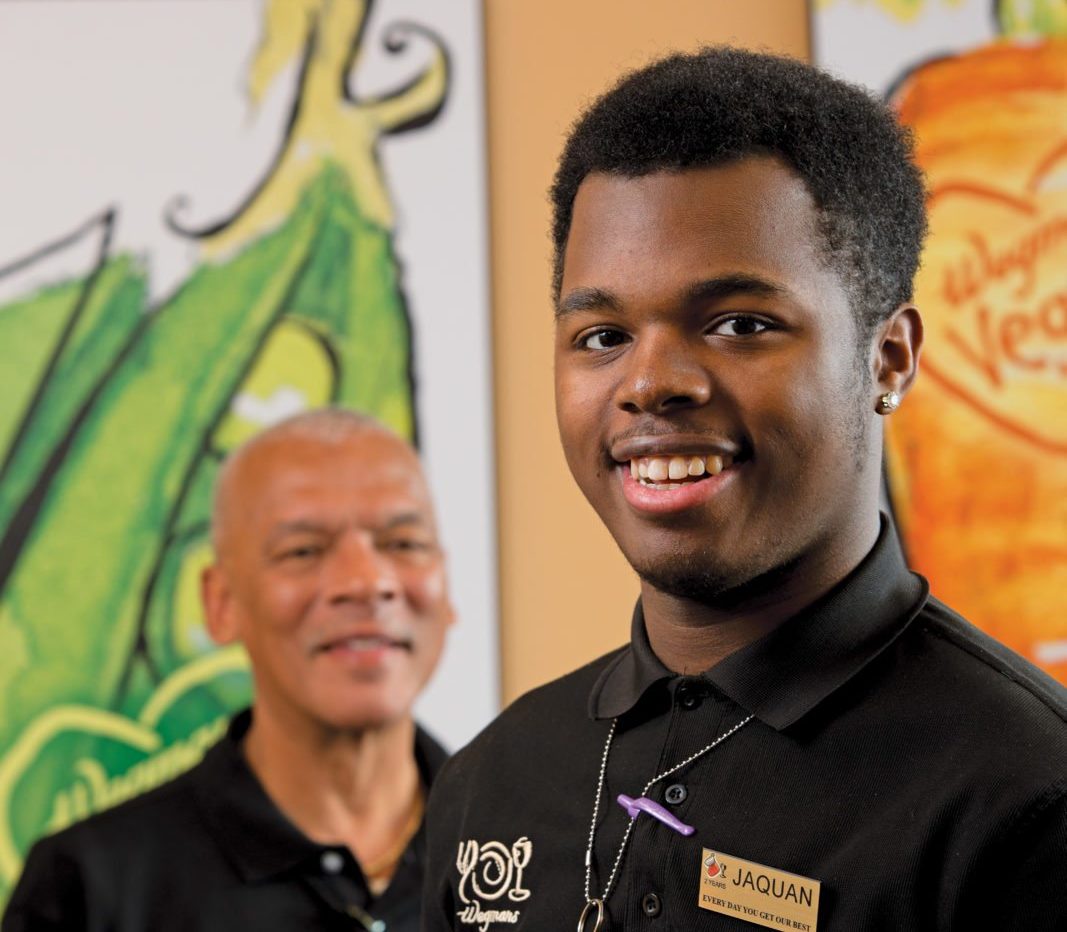PERINTON, N.Y.—The employee loading coconut milk into the dairy case is only 25, but she’s already marking her 10th year with the company.
The personable 19-year-old selling lottery tickets and handling queries at the customer service center is a self-proclaimed “inner-city kid” now on the management track.
The 17-year-old handing out samples of a yogurt smoothie graduated from high school a year early and is racing to overcome a troubled childhood by pursuing a career in psychology.
And the cashier is a Kenyan immigrant—the oldest of six children, a straight-A student, and in some ways the main man in a family headed by parents who speak little English.


All are valued employees at this 120,000-square-foot Wegmans supermarket near Rochester. The store is a modern marvel. The aisles are wide; the produce, meat, and seafood fresh; and the amenities, including a café offering fine wines and craft beers, are second to none.
The family-owned Wegmans chain, based in upstate New York, ranks near the top of nearly every consumer poll of the nation’s best supermarkets. Even the restrooms draw raves.
“Wow,” said a men’s room patron, marveling at a one-stop sink that dispenses water, soap, and a hand dryer. “Where else but Wegmans?”
Customers likely know little about the dairy department coordinator, the cashier, or the customer service rep here at the Wegmans in Perinton, 15 miles southeast of Rochester. But if shoppers looked beyond the store’s shiny amenities, they just might see the lives of these young people changing before their eyes. Those changes are part of an ongoing success story generated by the Hillside Work-Scholarship Connection, a Wegmans investment in the future of at-risk students.
For proof of that investment’s value, look no further than the customer service rep, Jaquan Gordon. “Before I started this program, I was just another black kid on the street with no job,” he says. Gordon, a first-year business management major at nearby Monroe Community College, recalls his first visit to the store as a transformational moment. “First time I walked through that door, I knew this is where I wanted to be and that I was going to challenge myself to be better,” he says.
Filling the talent pipeline
Gordon is no outlier here. In fact, his story mirrors those of many of Wegmans’ 300 work-scholarship employees. It also echoes in the ranks of the nearly 700 program alumni who have remained with Wegmans in transportation, customer service and management positions. The tuition support offered through Wegmans’ Employee Scholarship has helped 80 percent of the participants earn a credential beyond the high school diploma.
“We clearly have a pipeline for diverse talent,” says program coordinator Ty Kelly, a Wegmans employee for more than two decades.
The talent was flowing in the wrong direction in the late 1980s when Wegmans was struggling to recruit, develop and retain a reliable workforce. Its service area, greater Rochester, featured a public school system that produced more dropouts than graduates. Officials of the grocery chain came up with a plan to benefit the business and the school district—an alliance designed to give at-risk students an incentive to stay in school and a foothold to lifelong careers at Wegmans.

The plan had contingencies. Job offers would be extended only to students with a “C” average or better and with histories of steady school attendance. Employment was conditional, too. Wegmans would provide counseling and tutoring to student employees whose GPAs dropped below the hiring benchmark or whose attendance wavered, but an unchecked downslide could result in termination.
To monitor the status of program employees, Wegmans asked the district for access to student records. The district agreed and, in a bid to encourage student involvement, the company pledged tuition assistance to college-going students who remained with the company after high school graduation.
At first, the process of identifying, hiring, and mentoring work-scholarship students was handled by volunteer store-level and corporate employees. When the program took off, Wegmans brought in Hillside Family of Agencies, a nonprofit social service agency, to assist in the effort.
Hillside has since established Work-Scholarship Connection programs with the University of Rochester, Rochester Regional Health, Target and Tops Friendly Markets, a Wegmans’ competitor. The nonprofit also has a presence in Syracuse, Buffalo, and Albany. And, whether in health care, higher education or retail groceries, Work-Scholarship Connection has made a real difference. More than 90 percent of the program’s student employees graduate from high school (compared to a 51 percent graduation rate in Rochester), and a substantial number continue their education in certificate and degree programs.
Each of those success stories began the same way: with a handshake.
Face-to-face recruitment
Abigail Caraballo was in her ninth-grade homeroom at Rochester’s James Monroe High School when a Hillside Youth Advocate strolled through the door. The advocates Hillside assigns to each public high school in Rochester perform multiple functions. For students they act as mentors, counselors, and tutors. For participating Work-Scholarship Connection businesses and nonprofits, they act as recruiters. Recruitment can occur in a corridor, a cafeteria, a classroom, just about anywhere an advocate can snag a moment of a student’s time.

Caraballo was especially attentive when the advocate in her homeroom laid out the benefits of a work-scholarship position with Wegmans. The prospect of earning money—for clothes, her first cellphone and gifts for an extended family of 12 siblings and step-siblings—was enticing. So was the opportunity to work for a company that, to Caraballo, a recent transplant from Puerto Rico, represented middle-class success.
At 15, Caraballo barely met the program’s age requirement. But she more than exceeded the standards for grades and attendance.
Before receiving a formal job offer, Caraballo and other candidates for work-scholarship jobs had to meet the requirements set out by the Youth Employment Training Academy (YETA), a five-day Hillside boot camp that, according to Caraballo, “teaches stuff a high school student wouldn’t know.”
Lesson One: “Eye contact and a firm handshake”
(Ten years later, with her solid grip and steady gaze, Caraballo proves she was paying attention.) By the end of the week, Caraballo had also learned how to prepare a resume and dress properly for a job interview. YETA completed the training by testing her new-found skills in two mock interviews. Caraballo passed with ease, received a job offer and was welcomed by Wegmans with a $5 deposit in the savings account she maintains to this day.
She’s held several positions since punching a Wegmans time clock for the first time in 2008. Each step, from handling orders at the pizza counter to shift coordinator to her current position as a team leader in the Perinton store’s dairy section, represents a promotion and a step up the management ladder.
Never over the past decade has Caraballo taken for granted the opportunity she got as a high school freshman.
“It is really hard to get into Wegmans,” she says. “I know a lot of kids who have tried.” The Work-Scholarship Connection helps students get a foot in the door, she said. “They really push you. But without it, I wouldn’t be where I am now. I’d probably be working small, part-time jobs.”
Instead, her full-time salary allows Caraballo to support her 4-year-old daughter, rent her own apartment, set aside money in a life insurance policy, purchase a car and sock money away in a program for first-time home buyers. Her next priority, thanks to a gentle nudge from Ty Kelly, is investing in the company-matched 401(k) retirement fund.

Graduating from high school early, Caraballo also took advantage of the tuition supplement, earning an associate degree in criminal justice from Monroe Community College. She’s now thinking of enrolling in a law enforcement training academy. And should that occur, it will be with Kelly’s blessing.
It’s fair game if a work-scholarship employee has an opportunity to get into a desired field, Kelly says. “This is their first job. And I don’t care what your first job is, it teaches you to be accountable, how to work as a team member, how to handle conflict resolution, how to learn, and how to apply what is relevant in school to the workplace.”
Kelly knew of the work-scholarship program when he joined Wegmans in the early 1990s. But it wasn’t until a 1997 promotion put him in charge of an urban store that he came to fully appreciate the program.
“We had hiring needs, and I took full advantage of the program to staff my store,” he says. Five years later, the Wegman family put him in charge of the entire work-scholarship program.
The position requires Kelly to play several roles: administrator, counselor, manager, friend, confidante, cheerleader, transportation coordinator and, when necessary, a nag.
With 24/7 access to the Rochester schools’ database, Kelly knows if a student employee has flunked a test, racked up excessive absences, showed up late for classes, or faced disciplinary action.
Student performances are tracked in a thick folder filled with color-coded sheets—green for students maintaining at least a C average, yellow for kids at risk of falling behind, red for students with academic problems that could result in reduced hours or, in the worst case, loss of employment. The last step is taken only after other efforts fail—including intensive tutoring and mentoring from a Hillside advocate.
Wegmans also addresses an issue that often hampers low-income workers: transportation. The firm contracts with a private bus carrier to chauffeur student employees to and from Rochester neighborhoods.
In a way, one of those buses transported Jaquan Gordon to a new world. Riding through Perinton as a young teen, Gordon saw virtually no one who looked like him. Today, the “city kid” embraces his relationship with the mostly white clientele at the only Wegmans location he has ever worked.
“I love it here,” says the effusive Gordon. “Everyone treats me like family. I have a loving relationship with my customers, and I honestly believe most of them love me back.”
Gordon is here, he said, because of a Hillside advocate who cornered him in a school corridor and told him about Work-Scholarship Connection.
“She was on me about my grades, my attendance, my tardiness—everything I needed to get here,” Gordon says. “She let me know that to stay here I had to live up to the highest standards.”
Gordon not only stayed, he rose through the ranks, moving from cashier to the high-profile customer service position selling lottery tickets, responding to complaints, and handling refunds. In January, Gordon became the first in his family to pursue higher education, attending his first business administration classes at Monroe Community College. He says his accomplishments send a message to other young men in his neighborhood.
“I’m showing them that if I can do it, then they can do it,” he says. “If they put their mind to it then they can succeed at anything. All they have to do is set a goal and work toward it.”
Gordon’s co-worker, Endyia Allen, has never needed that kind of encouragement. Allen wanted a job so badly that she first tried to fill out a work-scholarship application at age 13. Never mind that the minimum working age in New York is 15.
Impatient to succeed
She was in no less a hurry to leave Rochester’s Northeast College Preparatory High School. Allen is an anomaly in a state where students are known to wait until the last minute to take the dreaded Regents Exams, the standardized tests required for graduation. She sat for her first Regents in middle school and completed all the requirements at the end of her junior year.
Seeing “no purpose in staying a whole other year,” Allen arranged to graduate at age 16 and moved directly from Northeast Prep to Genesee Community College, the first step toward becoming a psychologist or counselor. By then Allen had already been working as a Wegmans’ work-scholarship employee—starting, of course, as soon as she turned 15. Now 17, she’s forthright about the motivation to quickly leave childhood behind.
“I didn’t have the best life growing up,” Allen says. “My parents did not do what they needed to do. I think that’s why I wanted a job so badly. I wanted to take my own responsibility.”
This recollection, tinged with quiet compassion for the suffering of a mentally ill parent, explains her aspiration to study psychology. Her home now is a college dormitory. And for Allen, family has been formed in some ways by the co-workers and customers at Wegmans.

Allen works weekends only, limited by a full load of college courses, with the Wegmans tuition program covering part of the cost, and by a state law that prohibits full-time work for those under 18. Still she follows her grandfather’s advice and tucks $20 of every paycheck into a savings account.
“He told me, ‘I don’t care if you only work one day a week and make just $30, always take out $20.’ I have, and in two years it added up quickly,” Allen says. “That’s how I bought my car.”
Allen is a member of Wegmans’ Knowledge-Based Selling team, the supermarket employees who entice shoppers with product samples. She spent the first Saturday in 2018 mixing yogurt smoothies at a portable station, her ebullience winning over customers who had ventured out on a typically frigid Rochester-area morning in January.
Allen’s contagious enthusiasm for a job that “changed everything” has even reversed the fortunes of her best friend. “She was not doing well in school,” Allen recalls. “But she immediately got on herself as soon as she found out she could get a Wegmans job if she got her grades up. And now she’s full-time.”
The core of the Work-Scholarship Connection is a program that shows young people their own boundless potential. Another benefit, Kelly says, is a vibrantly diverse workforce for the 95-store Wegmans chain. And no Wegmans’ location makes the point better than the store that employs Gordon, Allen, and Caraballo.
The village of Fairport—and Perinton, the town that now encompasses it—were both founded during the 19th century heyday of the Erie Canal. Both are now part of Rochester’s suburban sprawl, and both feature populations that are affluent—with a median annual household income of $90,000—and 90 percent white.
It wasn’t so long ago that Wegmans Perinton employees looked very much like their customers. “I think we maybe had two African-Americans working out here,” Kelly says.
In other words, there was little chance that a shopper here would encounter any employee with a story like the one cashier Ali Hassan can tell.

The painfully shy Hassan clearly dislikes talking about himself. But when he looks back on his 15-year-old self—the ninth-grader who was recruited for the Work-Scholarship Connection from the Rochester Leadership Academy for Young Men—Hassan says that today he’s practically an extrovert.
Building people skills
“I really didn’t have any people skills or anything (until) I started the YETA program and learned how to talk to people and shake their hands,” Hassan says. Still far from loquacious, the 18-year-old nonetheless looks each customer in the eye, flashes the occasional smile and sometimes engages in friendly banter.
He brings to the task the intelligence of a straight-A student, the discipline of a volleyball and baseball athlete, and an immigrant’s appreciation for the opportunities created by Wegmans and his adopted nation.
Hassan was 5 when his family left Kenya to join relatives in Kentucky. A brief stay there ended with a second and permanent move to Rochester, where his father works in manufacturing.
Because his parents’ education essentially ended in elementary school, Hassan will be the first in his family to earn a high school diploma when he graduates in June.
The oldest of six, Hassan also serves as his parents’ connection to the English-speaking world, paying the family bills, filing tax returns, and translating important household paperwork. For his part, Hassan has transitioned easily from East Africa to the shores of Lake Ontario. He balances varsity athletics with a part-time job and has built an academic record that has him on track to earn the full scholarship awarded to every Rochester public high school student who’s admitted to the University of Rochester.
It’s a record that also has earned Hassan an annual Wegmans commendation for scholastic excellence. And he’s pocketed dozens of the free movie tickets awarded to student employees who exceed the work-scholarship academic benchmark.
The money Hassan earns during his weekend shifts at Wegmans comes in handy, but he points to an intangible form of compensation.
“It has helped me grow a lot,” he says. “When I’m at Wegmans, I show respect to every customer, no matter who they are. And I take that to school and show it to my classmates and teachers as well.”
At this point of his life, Hassan is looking no further than enrolling in college. Jaquan Gordon on the other hand, got a glimpse of what the future holds during a January conversation with Ty Kelly.
Gordon’s eyes widened as Kelly outlined the advancement opportunities for a young, smart, and determined employee interested in stretching his first job into a career at Wegmans.
Gordon already credits the store chain for providing “opportunities I’ve never had before. It’s made me stronger and made me shoot for higher goals and it’s going to help me succeed.” But listening to Kelly made him recognize the potential of turning the customer service rep position into something much bigger.
Summoning the first lesson of the Youth Employment Training Academy, Gordon turned to Kelly.
“Thank you,” he said, looking his mentor straight in the eye.
